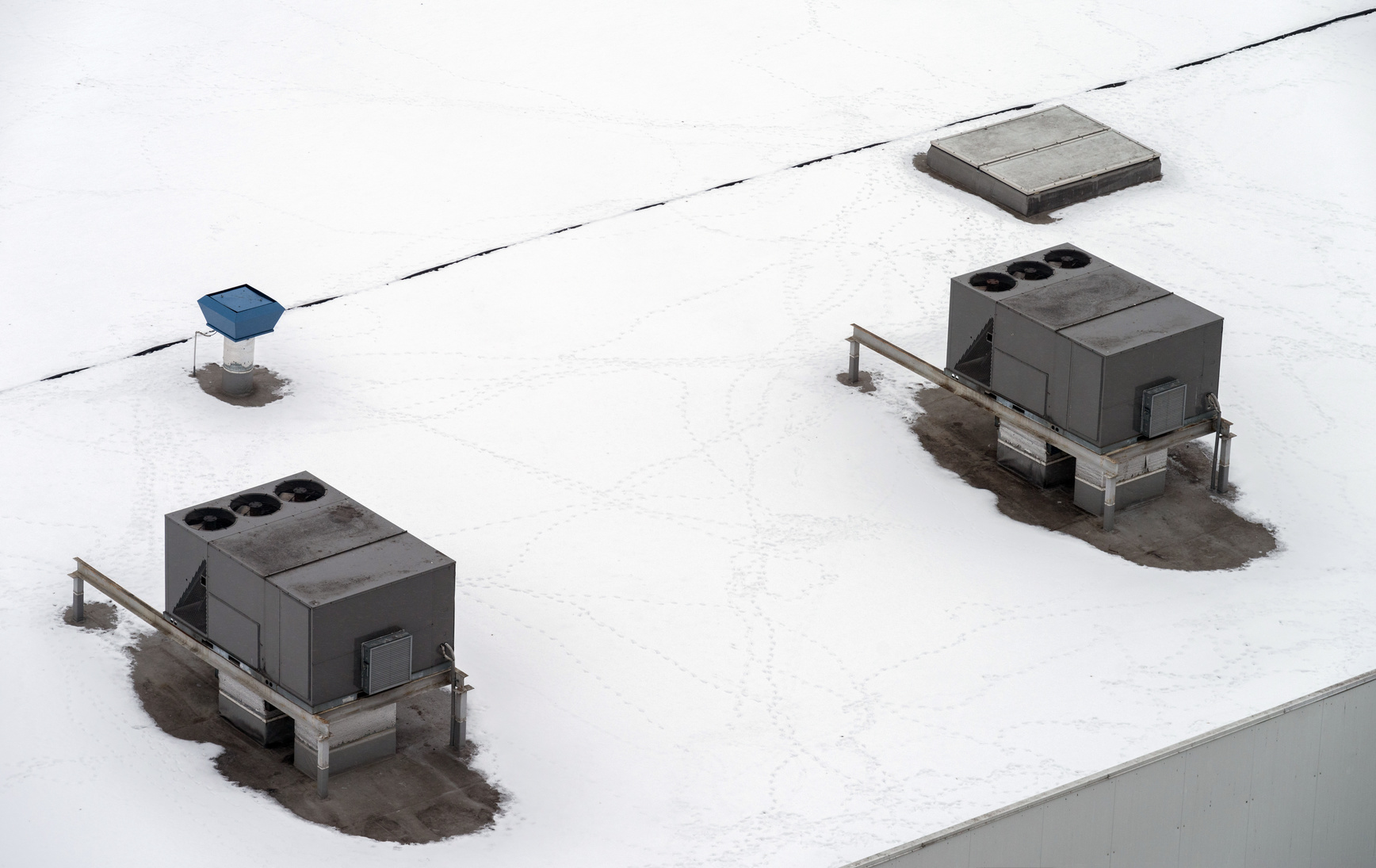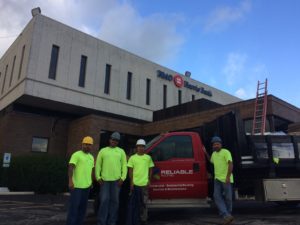Now that Old Man Winter on the way out, it is important to understand what the winter has wrought on your flat roofing system. From unpredictable freezing and thawing cycles to heavy snows, severe winter weather can take a devastating toll on commercial roofs.
Roofs, especially in locations that experience extreme weather, are manufactured to withstand the elements for 10 to more than 20 years. A well-maintained roof may even outlast its warranty. Ice, snow and subfreezing temperatures, however, can seriously diminish the lifespan of a commercial roof. Timely inspections and focused maintenance can deter the following effects of winter weather on your commercial roof.
How Winter Weather Affects Commercial Roofs
Heavy Snowfalls
Despite its light and airy appearance, snow accumulations are very heavy. Freshly fallen snow is responsible for adding up to 20 pounds (per cubic foot) of extra weight to your roof. The roofing system is further stressed when 60 pounds of weight result from the snow’s partial thawing and refreezing. It is this weight, thaw and freeze combination that wreaks havoc on flat roofing.
A worn roof becomes an infrastructure hazard when winter makes its grand, annual appearance. The roof’s seams are vulnerable to the forces of heavy snow and the movement that comes with freeze thaw cycles. Exposure to the building’s interior heat melts the lowest layers of snow. Extreme cold snaps then freeze that layer. If the melted snow has penetrated the roofing material or worked its way into seams, the freeze cycle can be devastating to the roof system. When water freezes it expands. Water caught in your roof plies may freeze and “pop” the roofing layers leaving severely weakened seams or visibly open gaps. This freeze thaw cycle can continue into spring. As the roof system ages, it is decreasingly able to withstand the effects of harsh freeze-thaw cycles. A leaky roof is the undesirable result.
Keep freeze – thaw damage in check with a seasonal drainage inspection performed by a professional roof inspector. The roof’s drains, scuppers, gutters, and downspouts should be free of debris. Gatherings of leaves and twigs are a common occurrence in flat commercial roofing systems. A clear, unobstructed path prevents the blockages that could likely result in hazardous ice dams which exacerbate freeze-thaw damage.
Thermal Shock
Buildings situated in areas that experience extreme temperature changes are prone to roof damage. The widely varying daytime and nighttime temperatures are responsible for the event known as thermal shock.
Roof expansion and contraction occur like clockwork when the winter season strikes. The roof expands during the warmer daytime climes and contracts during the subfreezing night. Constant roof expansions and contractions lead to cracks, shrinkage, and stress on the roof’s seams.
Plus, thermal shock adversely affects the roof’s overall tensile strength, which is greatly reduced after repeated expansions and contractions. Over time, the roof membrane or plies are weakened as they lose the ability to functionally expand and contract.
Best practices when it comes to minimizing thermal shock is to hire a roofing technician twice a year to examine the roof. The technician will look for stress cracks and other signs of wear. A roofing specialist will compare photos from prior inspections with the current state of the roof. The professional may advise renovations to the roof to protect the system from the effects of thermal shock.
Regular inspections and maintenance of your commercial roof extend its life by up to 25 percent. Though new roofing systems benefit from periodic inspections, an aging roof particularly requires extra attention. When you suspect roof damage, or if you aim to take a proactive approach to your commercial roof maintenance, consult the experts at Reliable Roofing.
How to prepare and protect your roof from Winter’s harsh effects:
- Inspect the seems and flashings at least twice per year.
- Repair open seems or damaged flashings as soon as possible to prevent moisture infiltration.
- Keep drains clear to allow melted snow and rain to drain from the roof as easily as possible.
Reliable Roofing
Reliable Roofing is a dependable roofing contractor with skilled technicians who will expertly service your commercial roof any time of the year. Comprehensive commercial roofing services include commercial roof repair, commercial roof replacement and commercial roof maintenance. If you notice wear and tear to your roof in between inspections, our contractors at Reliable Roofing will rebuild your damaged roof with industry-leading expertise.
Reliable Roofing serves businesses of all sizes. Our roofing contractors have successfully serviced various commercial structures, including warehouses, office buildings, and restaurants, among many other types of buildings.
Reliable Roofing provides skilled roofing services to commercial properties in the north Chicago suburbs including Lake Zurich, IL. Reliable Roofing is a property manager’s one-stop source for every commercial roofing dilemma.
Free Estimate
Contact our specialists at (815) 981-9898 to find out more about our wide-ranging commercial roofing services or obtain a free estimate.
 We support our Troops, Police & Freedoms
We support our Troops, Police & Freedoms


